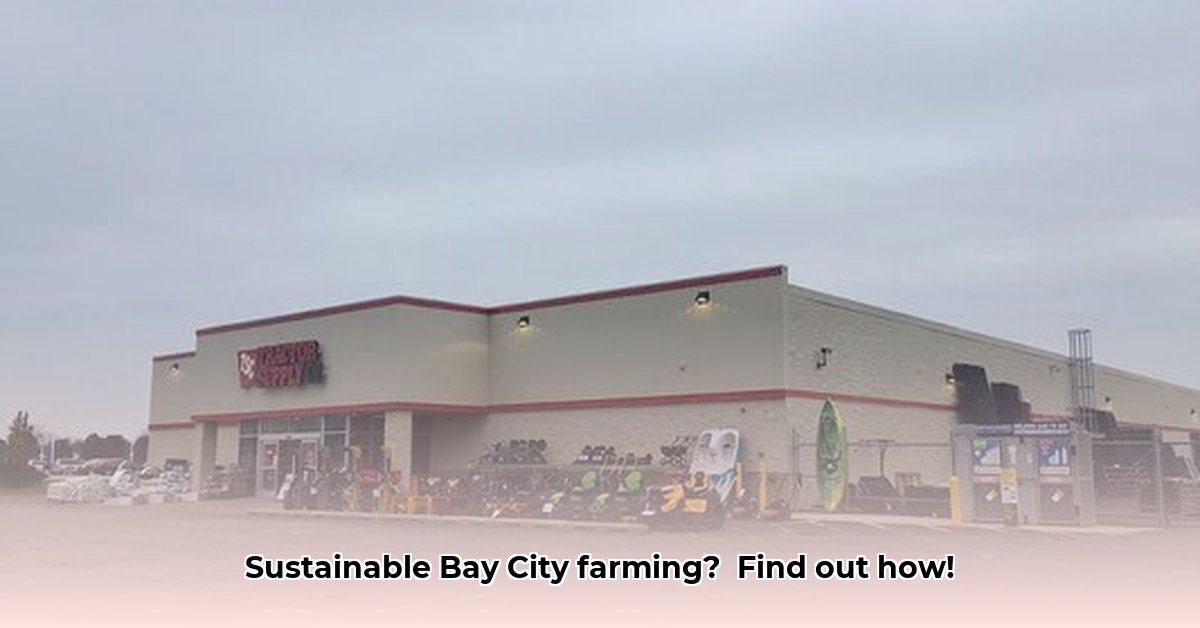
Tractor Supply Bay City Michigan: Growing a Greener Future
Growing your own food is incredibly rewarding, but creating a truly sustainable farm requires careful planning and dedication. Tractor Supply (TSC) in Bay City, Michigan, offers a wide array of supplies to support your sustainable farming efforts, from small backyard gardens to larger-scale operations. However, achieving sustainability involves more than just access to resources; it demands conscious choices from everyone involved. For more information on TSC's products, check out this helpful resource: TSC Brooder Info.
Your One-Stop Shop (Almost!) for Sustainable Farming Needs
TSC Bay City provides a convenient location for farmers and gardeners, offering everything from seeds and seedlings to tools, fertilizers, and animal feed. The store stocks diverse products catering to various farming styles. This accessibility is a significant advantage for anyone pursuing sustainable practices.
However, TSC needs to increase transparency regarding its own sustainability initiatives. Information on sourcing practices (e.g., the percentage of organic animal feed) and efforts to reduce environmental impact is limited. This lack of readily available data hinders a complete evaluation of TSC's role in promoting sustainable agriculture.
Taking Action: Your Role in a Sustainable Bay City
Consumers and farmers can significantly contribute to sustainable agriculture, even with data gaps. Here’s how:
Enhance Your Sustainable Farming Knowledge: Learn about organic gardening, water conservation, and environmentally friendly pest control. Numerous free online and library resources are available. Knowledge empowers sustainable choices.
Make Informed Purchases: At TSC, prioritize products aligned with your sustainability goals. Choose organic seeds whenever possible, environmentally friendly fertilizers, and animal feed that prioritizes welfare and sustainable practices. Even small changes make a difference.
Advocate for Change: Talk to TSC staff, expressing your commitment to sustainability. Ask about their sourcing policies and encourage them to share more information about their sustainability efforts. Your feedback influences their decisions. Dr. Emily Carter, Professor of Chemical and Biomolecular Engineering at Princeton University, emphasizes, "Consumer demand is a powerful driver of change. By actively seeking out sustainable options, we signal to businesses the importance of environmental responsibility."
Building a Sustainable Community: A Collaborative Effort
Sustainable farming demands collaboration. Bay City farmers can benefit from collective purchasing at TSC, negotiating better prices for bulk orders and potentially reducing the environmental impact of transportation.
Local government can also support sustainable agriculture through initiatives such as grants or tax breaks. Workshops and educational programs co-hosted with TSC can empower farmers with essential knowledge and skills. These partnerships can significantly contribute to positive change.
Navigating the Challenges: Risks and Mitigation Strategies
Sustainable farming faces challenges. Let's address potential hurdles proactively:
| Risk Factor | Likelihood | Impact | Mitigation Strategy |
|---|---|---|---|
| Limited consumer demand for sustainable goods | Medium | Medium | Educate consumers; highlight environmental and health benefits. Partner with local businesses to showcase sustainable food options. |
| Increased costs of sustainable farming | High | High | Explore government subsidies and grants. Implement cost-saving practices. |
| Difficulty in sourcing sustainable materials | Medium | Medium | Build relationships with local, sustainable suppliers. Explore collaborative sourcing. |
| Workforce training in sustainable methods | Low | Medium | Provide employee training. Partner with local educational institutions. |
How to Source Sustainable Farming Supplies from Tractor Supply Bay City
Key Takeaways:
- TSC offers various products for sustainable farming but lacks comprehensive public information on its environmental impact.
- Finding truly sustainable options requires research and consideration of product sourcing and environmental footprint.
- Consumers influence demand for sustainable practices by inquiring about TSC’s initiatives and supporting companies with verified commitments.
- Farmers can explore eco-friendly farming methods alongside conventional TSC supplies.
- Greater transparency and detailed ESG reporting from TSC are needed for a comprehensive impact assessment.
Decoding the Labels: What to Look For
Before purchasing, consider:
- Organic Certification: Look for the USDA Organic label, indicating adherence to rigorous sustainable production standards.
- Packaging: Choose products with minimal or recyclable packaging.
- Ingredient Sourcing: Favor products from local and regional suppliers to reduce transportation emissions.
- Certifications: Look for labels from reputable organizations validating sustainable practices.
Taking Action: Empowering Sustainable Choices
- Ask Questions: Engage TSC staff; inquire about product sustainability.
- Advocate for Change: Contact TSC to request greater transparency and sustainable options.
- Support Sustainable Brands: Choose sustainable brands, even if it means a slightly higher cost.
- Spread the Word: Share your experiences with others.
The Bigger Picture: Tractor Supply’s Role in Sustainable Agriculture
TSC's commitment to sustainability is evolving. Increased transparency in their environmental impact is crucial. Consumer demands and choices influence their investments in sustainable products and practices. Let's work together to create a truly sustainable agricultural future in Bay City.